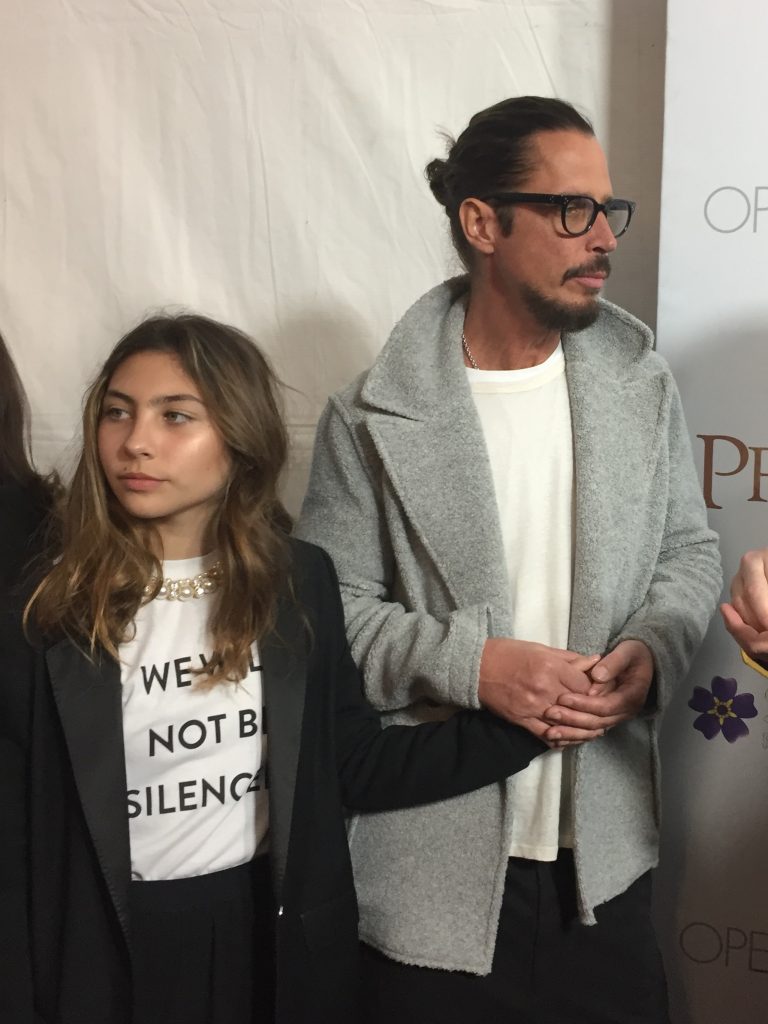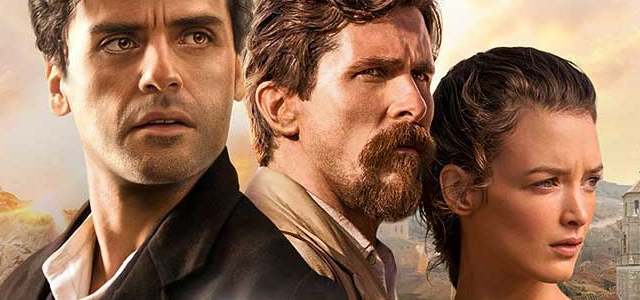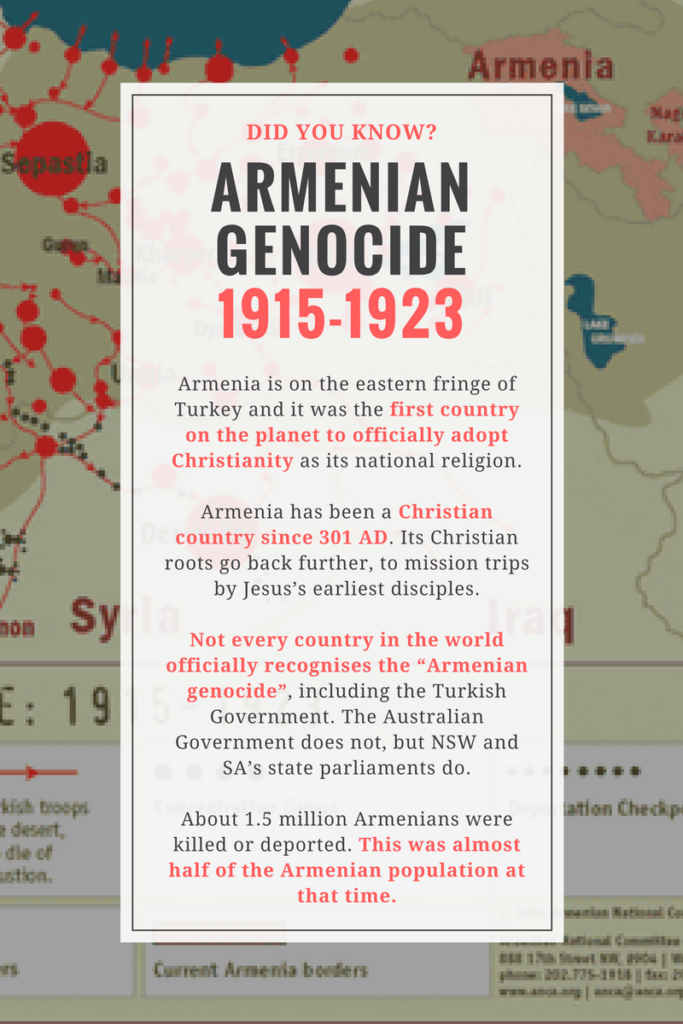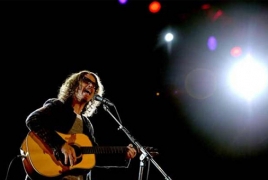A moving, epic, sumptuous film on the suppressed topic of the Armenian genocide.
Powerful people are deploying every trick to prevent you from seeing
The Promise, director Terry George's 2016 film starring Oscar Isaac, Christian Bale and Charlotte Le Bon. Their insistence that you not see the film rouses suspicion. After all, Terry George is a something of a cinematic social justice warrior and critical darling. He's known for taking on righteous themes, including the English imperial abuse of Irish prisoners in his 1993 film
In the Name of the Father, nominated for seven Academy Awards. His 2004 film,
Hotel Rwanda, received three Academy Award nominations.
The Promise's script is by George and Robin Swicord, who also has an Academy Award and a Golden Globe nomination under her belt.
George's Hotel Rwanda depicted the Rwandan genocide. Rwandans died in that signature African phenomenon: tribal violence. Hutus rose up with machetes and murdered their neighboring Tutsis in the world's fastest genocide. Hotel Rwanda tells a different story. Rwandans died because white people don't care about black people. In the film, Nick Nolte, playing a UN general, "explains" the genocide to Don Cheadle, playing the real-life hero and rescuer Paul Rusesabagina. "You're dirt. We think you are dirt. You're dung. You're worthless. You're black. You're not even a n - - - - -. You're an African … They're not gonna stop the slaughter."
Hotel Rwanda never explains how white people living thousands of miles away could stop a million killings-by-machete occurring over a hundred days. Rwanda is remote, landlocked, and mountainous. There were no airports, train tracks, or installations to bomb. Getting troops into Rwanda would have taken months and given the volatility of the area, the insertion of American or European troops would have sparked separate conflagrations. Witness the horrific fate of the humanitarian mission in the Battle of Mogadishu in October, 1993 – a mere six months before the Rwandan genocide. No matter. It's whitie's fault. That movie, the powers that be want you to see.
The powers that be don't want you to see The Promise, though it stars Oscar Isaac, previously praised for the box office smash, Star Wars: The Force Awakens and the critical smash Inside Llewyn Davis, by the hipster Coen Brothers. What, then, is the problem with The Promise and why don't powerful people want you to see it?
The Promise dramatizes the 1915-1923 Armenian Genocide. An estimated 1.5 million Armenians were murdered by Ottoman Turkey and its successor, the Republic of Turkey.
The victims of the Armenian genocide were Christians. The perpetrators were Muslims.
Armenians are not just any Christians. They are an indigenous Middle Eastern people. They have lived on their land, as recognizable, autonomous Armenians, for over two thousand years. In 301 AD, Armenians were the first to adopt Christianity as their state religion. The Edict of Thessalonica did not make Christianity Rome's state religion until 380 AD. Etchmiadzin Cathedral, whose construction began the year Armenians adopted Christianity, is the oldest cathedral in the world. Armenians began fighting jihadi invaders over a thousand years ago, significantly at the 1071 Battle of Manzikert. In 1400 Tamerlane, the Sword of Islam, buried 4000 Armenians alive. The Armenian Kingdom of Cilicia supported the Crusades. That's right – indigenous people of the Middle East supported the Crusaders against jihadis. Theirs is a narrative that will rankle any number of powerful opinion-makers.
The first notorious genocide of the bloody twentieth century was not Hitler's. It was the Turks'. Hitler was quite impressed with how the Turks got away with years of expulsions, selective assassinations, starvation and literal, not metaphoric, crucifixions. In an August, 1939 speech, just days before beginning his assault on Poland that would spark World War II, Hitler uttered his notorious "Armenian quote." "I have placed my death-head formation in readiness … with orders to them to send to death mercilessly and without compassion, men, women, and children of Polish derivation and language … Who, after all, speaks today of the annihilation of the Armenians?"
I am Polish, and thanks to this quote, I feel myself to be an honorary Armenian. Playwright William Saroyan produced an "Armenian quote" of his own, saluting a "small tribe of unimportant people, whose wars have all been fought and lost, whose structures have crumbled … and prayers are no more answered. Go ahead, destroy Armenia … Send them into the desert without bread or water. Burn their homes and churches. Then see if they will not laugh, sing and pray again. For when two of them meet anywhere in the world, see if they will not create a New Armenia." With this quote, Saroyan is an honorary Pole.
The Armenians' would-be annihilators are also part of the reason that one must not speak of the Armenian Genocide. Turkey is part of NATO. Turkey hosts the Incirlik Air Base. Those are reasons why US presidents may refrain from using the word "genocide" and, as John Oliver put it, resort to diplomatic doublespeak in phrases like, "Armenia's terrible, horrible, no good, very bad day."
The politically correct don't use the same thesaurus as US presidents. Let's spell out their concern. In the first notorious genocide of the Twentieth Century, Muslims murdered Christians. Further: Muslims murdering Christians and taking over their territory was not an aberration. These murders were not committed in disobedience to scripture or tradition or even trends. The Turkish genocide against Armenian Christians was in accordance with scripture, tradition, and trends. These traditions began with Mohammed himself, who ordered the expulsion of Arab Christians and Jews from the Arabian Peninsula. Arabs who vacillated in their commitment to Islam were brought to heel in the Ridda Wars. For the past 1400 years, the Middle East's Christian populations have been shrinking. The Armenian Genocide is not an isolated event. It's part of a chain of events we are not to be aware of or discuss.
Politically correct opinion-makers don't want you to know that Christianity began in the Middle East. They want you to think of the fault line between terror and its victims as a line between dispossessed, swarthy, colonized, Third World peasants practicing their "indigenous" religion and Christianity, the tip of the colonizers' spear. They want you to think that some very pale person named Smith or Jones marched into the Middle East with a Bible and under the color of a colonizer's flag. It astounds me but it's true – semester after semester I ask university students to plot on a timeline the founding dates of Judaism, Christianity, and Islam. Most of them think that Islam was founded first, and Judaism and Christianity somehow branched off. Really. Really.
This politically correct narrative is nonsense. By PC's standards, the first Christians were swarthy, colonized, peasants in the Middle East. Swarthy Middle Eastern peasants were the first victims of jihad, and the first to fight back against jihad. Muslims were the colonizers. Some populations have been fighting continuously for over a thousand years. They've been saying mass, erecting crosses, and surviving in Egypt, Iraq, and Armenia. Their numbers, and their territory, grow smaller year after year. Asking why those borders and demographics shrink is an awkward question for the politically correct.
Take Egypt in the fourteenth century. Egypt, the most populous Arab nation, had a majority-Christian population long after the Arab Conquest. Persecution reduced their number. Christians were freely robbed, murdered, their churches were closed, and Muslim sermons demanded hostility to them. At times Christians had to wear a five-pound cross. At other times, in other places, Christians had to wear a patch on their clothing in the shape of a pig; Jews had to wear a donkey-shaped patch, or bells. Historians cite these patches as precursors to the patches Nazis forced their victims to wear. Christians could save their lives by converting to Islam, but even then they were forced to prove the sincerity of their conversions by attending mosque. They could not will their money to any Christian relatives – only those relatives who converted to Islam could inherit. Those lines around Christian territory, those tallies of Christian populations, didn't shrink because someone read a pamphlet, compared and contrasted the theological claims of each faith, and made a decision out of his free conscience. Populations shrank because of persecution. Those persecutions interfere with politically correct history.
Assyrian Christians speak a variety of Aramaic, a Middle Eastern language that predates Arabic. Copts' liturgical language is late stage Egyptian. Egyptian has the longest documented history of any language and predates Arabic in Egypt by thousands of years. The mere existence of Armenians, Copts, and Assyrian Christians poses an awkward question for Middle Eastern Muslims. A group of Middle Eastern Christians ask, on their website, "Why were you born in Islam?" Your ancestors were not Muslims, this website insists. They converted to Islam. Why? Is it because of the kind of pressure Islam brought to bear on the Armenians? Muslims, if you watch a film like The Promise, do you imagine that this is what it was like for your non-Muslim ancestors? Do these persecutions, dramatized onscreen, provide a missing link in your family tree? I think it would be impossible for a Muslim to reflect on how Muslims pressured non-Muslims to convert or die and not to think about his or her ancestors. When did the ancestors cave in, and what did it take for them to leave their natal faith? A massacre? Oppressive taxation? The violation of female family members? Or was it a promise of wealth if they joined in the looting? These are uncomfortable questions.
And those persecutions raise even more awkward questions. If this is what jihad has done to Christian, Jewish, and Zoroastrian populations in the Middle East, what will it do to us? The Byzantine Empire and states like Armenia once felt as secure in their Christianity as American Christians might feel today. Do we, as they did, have a target on our backs? Are our civilizational timelines, as were theirs, shrinking?
Now you know why powerful people don't want you to see The Promise. Why 57,000 people flooded the International Movie Database to give the film one-star ratings long before it even opened.
University of Haifa Professor Stefan Ihrig is the author of Justifying Genocide: Germany and the Armenians from Bismarck to Hitler. Ihrig insists that the Armenian Genocide and the Holocaust are connected, and one cannot understand one without the other. But even publishing on the Armenians has cost Ihrig. Writing in Forbes, Ihrig reports: "Speaking out on the Armenian Genocide means taking a huge risk. At the very least, it will be an exhausting experience, getting harassed online, trolled, threatened, down-rated on Amazon and publicly vilified. Until now, this was true mainly for individuals – academics, artists and activists. Now, it seems to apply to Hollywood movies, too."
The Promise has a low rating at the review aggregate site, RottenTomatoes. Oscar Isaac's Coen Brothers' film Inside Llewyn Davis has a 94%, certified fresh rating. Hotel Rwanda, Terry George's previous genocide film, has a certified fresh 90% rating. Hmm.
I am a diehard movie fan. As such I place aesthetics above message. I am here to tell you that The Promise is a darn good movie. It's not a great movie. When it comes to genocide movies, it's not Schindler's List, In Darkness, or Europa Europa. The Promise just misses being a great movie. It moves too fast. The film should have lingered more, let us get closer to its characters. There is a scene where a man admires a woman's sketch book. That scene should have showed us more of her sketches. There should have been at least one paragraph more explaining the genocide to the audience. Armenians were Christians in a majority-Muslim state. They were a middleman minority – often better educated and wealthier than their neighbors. Turkey was fighting a war, and feared Russia, a neighboring, Christian nation, and its outreach to Armenians. Christians in a Muslim-majority state were accused of divided loyalty. The film could have benefitted from a deeper explication of these factors. But The Promise is a very good movie, and for that reason, not for any political message, you should see it.
Oscar Isaac's performance as Mikael, an Armenian medical student, is mesmerizing. Had this been a film about a more PC-friendly genocide, Isaac would receive an Academy Award nomination, and possibly win. His presence is the soul of the movie. His performance may as well have been wordless. He is all eyes as he takes in, in the opening scenes, his beloved natal village, then Constantinople, the big city he must travel to to study medicine, his heart-stopping first encounter with the woman he, in spite of himself, loves, and, finally, the evisceration, torture, and fight-to-the-death of his beloved people. He is the blank slate on which history writes. He is so pure that the world's darkness splatters across his features as ink titrated from human tears and the black ashes of Hell.
Christian Bale is a brilliant actor who is perhaps genetically incapable of making a bad move onscreen. To his smaller role as an American reporter covering the genocide, Bale brings all of his craft. He can and does communicate pages of unspoken soliloquy into a couple of understated gestures. As part of a triangle involving Isaac, Bale must communicate a love that is consuming, possessive, and that supports great sacrifice. Bale inhabits his role so thoroughly he wrung tears from this viewer.
Charlotte Le Bon is the lovely love interest, an Armenian who was raised in France and picks a very bad time to explore her roots. The supporting cast consists of world-class actors. Jean Reno, Tom Hollander, Shohreh Aghdashloo, James Cromwell, Rade Serbedzija and Marwan Kenzari command the screen in small, vital roles.
The Promise has been called the most expensive independently financed film. Kirk Kerkorian, an Armenian-American businessman, provided funding for a film that politics would have liked to suppress. Kerkorian was born in Fresno in 1917, as the genocide was taking place. He died at 98 years old, before he could see the completed film. His investment is all over the screen. If you like big, sweeping, sumptuously-produced historical epics, you will love this movie. I would like to watch it again on video just to freeze the frame and linger over the set and costume details. The Promise was shot in Spain, Portugal, and Malta, which do manage to look like Turkey.
Critics have faulted the film for including a love story in a movie that dramatizes a genocide. This criticism is uninformed. Read enough memoirs, and talk to enough survivors. Yes, people do fall in love under the most challenging circumstances. Auschwitz hosted a famous love story. Mala Zimetbaum, a Jewish prisoner, fell in love with Edek Galinski, a Polish one. Their story is legendary and inspired many of their fellow prisoners. Poet John Guzlowski's parents met while his father was on a death march out of Buchenwald. The Nazis marched Guzlowski's father past the camp where his mother was interned. Their marriage lasted for over fifty years. Guzlowski himself was conceived and born in a post-war UN DP camp.
The Promise is neither an anti-Muslim nor an anti-Turkish film. Perhaps its most poignant performance is that of Tunisian-Dutch Marwan Kenzari as Emre Ogan. Ogan is a pretty, young party boy who just wants to have fun. It's purely an accident of fate that he is a Turk during a genocide. Ogan is a complex, sympathetic, human character. We can identify with his moral quandaries. There are other Muslim Turks in the film who clearly oppose the genocide and support the Armenians. Wikipedia quotes many Turks who, at the time of the genocide and not long after, condemned it. I've been lucky enough to travel to Turkey, and I've loved few destinations more. There is nothing I would like more to see than a new, enlightened Turkey acknowledge the sins of the past, and repent for them. I hope and pray for that day, for the Armenians, for Turkey and the Turks, and for the world.
One last word. I refer, here, to the Armenian Genocide as part of a trend of jihad's encroachment on, and elimination of, non-Muslim, indigenous populations. Some will insist that the Nazi genocide of the Jews is comparable, and that it proves that Christianity is a genocidal religion. I disagree. Yes, Christians have frequently failed to act according to Christian scripture, none of which command anything like jihad or genocide. Yes, Christians have often persecuted Jews. But, Nazism, not Christianity, was responsible for the Holocaust. For support I defer to books like Richard Weikart's Hitler's Religion. My review of Weikart's book can be found here. My piece, "Against Identifying Nazism with Christianity" can be found here.
http://www.frontpage...danusha-v-goska
 (Photo: Grace Hill Media)In this scene, Michael temporarily manages to avoid conscription in the Turkish army through a medical student exemption with the help of a friend, April 21, 2017.
(Photo: Grace Hill Media)In this scene, Michael temporarily manages to avoid conscription in the Turkish army through a medical student exemption with the help of a friend, April 21, 2017.































